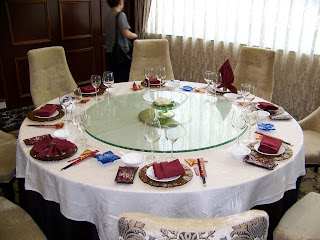On the evening we arrived in China after 24 hours of varied wakefulness, 18 hours of which involved flights and airports, Rochester to JFK to Hong Kong, followed by transport via car from Hong Kong to Edward's family home in Shenzhen, including two border crossings and a "random" but extra stop to have our luggage X-rayed, we were greeted with enthusiasm by Edward's dogs.
The whole Zhang family turned out, actually -- father, mother, grandmother, brother, house maids -- with apparent enthusiasm for the American guests. Maybe the brother did not look as thrilled as everyone else, but who noticed. At that point we were thinking bed, mostly bed, simply bed. But the family, hospitable as ever, was thinking dinner.
Dinner is a specific form of hospitality, a welcoming gesture in most cultures, and China is no exception, so dinner it was.
Our first dinner in China consisted of snails, shrimp, beef, tofu (raw and cooked), three or four kinds of greens that included spinach and lettuce of several varieties in chicken soup, octopus, potato, a vegetable root with holes, beef meatballs and fish meatballs. The potatoes, root, and octopus were in the soup. Maybe the meatballs were in the soup, too, but my notes don't report that detail.
Sadly I have very few pictures of the food we were served. I knew I would regret the absence of photographic evidence, but my efforts, especially at the beginning, were aimed at avoiding cultural missteps that I would regret later. Better to err on the side of sensitivity and respect.
This molded fish, swimming among pineapple chunks, was made of something like tofu with a sweetness to it -- not sweet in the American way, but sweet-ish none-the-less. (It came, actually, as part of our last dinner in Shenzhen rather than our first night.)
Still, this gold fish was very good. No bones. I ate it, head, tail and all.
The snails were a special delicacy, a treat I'm sure for this special meal.
Meat always comes in strips and usually with other things, a vegetable, for example, or bitter melon. These may be part of soup or they may be added to the soup or they may be eaten alone. A whole piece of meat, like a steak, or meat cut into slices (like roast beef or slices turkey), would be a western thing rather than Chinese. We did have steak once, but I think it was provided as a kindness to the Americans.
Tofu, which has never interested me much, being predisposed like many Americans to dislike it on principle, can be fixed in a variety of ways. It is quite good when it is cooked, bland when raw. Much was bland or mild; very little came to the table spicy, although you could make it that way if favor burning sensations.
Shrimp, too, are often favored. I have at least one good shrimp story I will save for later. Octopus as we had it generally means little pieces of baby octopus, which I found easy to eat once I determined to eat without inspecting. The red octopus on ice in this photograph is for display.
"Vegetables" refers to a variety of greens. They look a little different than American varieties of greens, especially lettuce, which the Chinese boil. I had never seen boiled lettuce before YuSi, our first Guangzhou home stay daughter, cooked it for us at home. The texture changes but the taste, or what there is of taste, stays the same.
The vegetables with holes tasted very much like potato. We learned later that it was lotus root. I couldn't have guessed.
Apart from the number of soup dishes, the real departure from American expectations are the meat balls. Over the course of the first three or four days we had lots of meat balls that were beef or pork or fish. Here again it is not the taste -- although I must confess I have not eaten fish meat balls anywhere else. The chief difference is the texture.
Chinese meatballs are dense little things.
American meatballs (that is, those of European origin) fall apart easily, sometimes with no prodding. Chinese meat balls or fish balls, on the other hand, stay together. They are solid as well as dense, and they are little -- about the size of a ball on a paddle-ball toy, with the consistency and mild taste of a round hot dog. Pretty much like round hot dogs, if we had such things. Often they are in soup, as they might have been on our first night in China.
Often, too, meals are served without tea or water. One simply drinks the soup.
I have recounted this meal in clinical detail because it proved to be typical of what we were served frequently. For the record, I ate everything that was offered in our first real Chinese dinner.
I was not able to say I always ate everything; but at the beginning I was determined to eat anything that didn't look back at me.





No comments:
Post a Comment